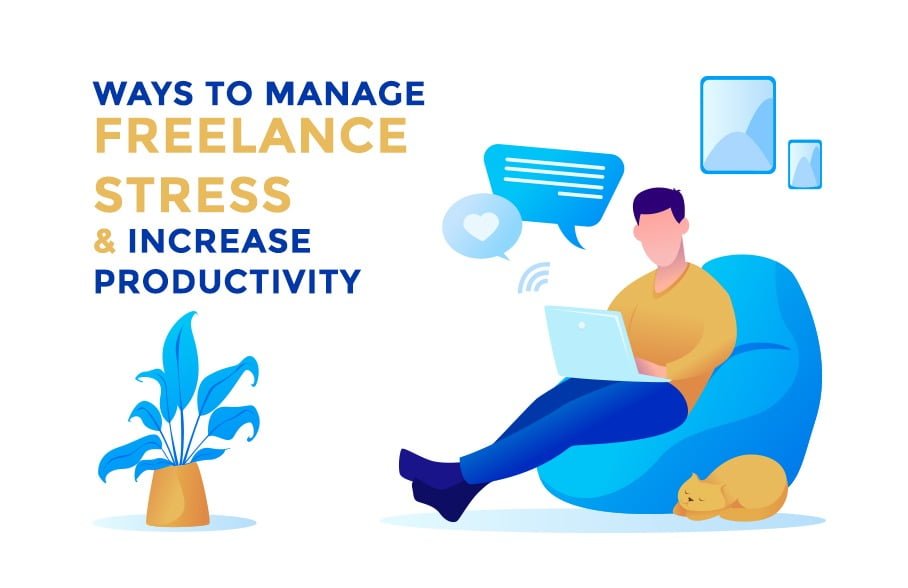The life of a freelancer looks charming, and many people on the nine-to-five desk slog will greed for the freedom and elasticity that come with this type of work. You can choose where you work, how long you work for, what kind of work you take on, the bulk of work you do, and who you work for. While all this sounds seamless, the most common myth about freelancing is that it is stress-free.
However, nothing can prepare you for the added stress that comes with working independently. Merely lacking the safety net of having a permanent full-time role within a company can be stressful enough for some people, as well as the need to self-motivate when you just aren’t feeling it.
Plus, there will always be times when work is infrequent, and you’re stressed about making enough money and finding more jobs, and then there will be high-pressure periods when managing the amount of work and meeting targets will be just as demanding and exhausting.
This fluctuation is hard to get used to, and in my own freelancing experience, the unknown nature of what comes next is still something I’m getting used to. I have, however, come around to the fact that I am the creator and the manager of all the stress I create.
Freelancing can seem like a rollercoaster, as your workload can often fluctuate. Here are a few habits I’ve developed to manage to work my freelance stress and avoid burnout. I hope you find them as helpful as I do.
1. Learn to say No
Not commonly found in a freelancer’s vocabulary is the word “no.” However, there are some gigs and projects that simply aren’t worth it. A common cause of stress is having too work much to do and too little time in which to do it. And yet, in this situation, many freelancers will still agree to take on additional responsibility. Learning to say “No” to other or unimportant requests will help to reduce your level of stress, and may also help you develop more self-confidence.
Here’s when I consider saying no-
· When my plate is already too full- There’s nothing worse than over-promising and under-delivering, and that’s an easy trap to fall into if you’re already feeling spread thin.
· When the pay doesn’t meet my expectations- I’m not embarrassed to confess that I worked for a meager salary when I was just getting started as a freelance writer. I didn’t feel justified in demanding high rates from people who were willing to take a chance on me. But once you’re a little more established, you have a much better grasp of what you’re worth, and you’re justified in asking for that.
· When I’m not excited about the work- Much like any other job, you aren’t going to be over the moon about everything you get to work on as a freelancer. However, you are allowed to be a little selective in terms of finding work that ignites some enthusiasm. Maybe that client seems like they’d be challenging to work with. Or possibly the assignment looks entirely snooze-worthy for you. Regardless of the specifics, if you’re not in a position where you have to take on work for income, don’t feel pressured to accept projects that make you groan. Chances are, you won’t end up being proud of what you produce anyway.
2. Avoid caffeine, nicotine, and alcohol in large quantities
Avoid, or at least reduce, your consumption of nicotine and any drinks containing caffeine and alcohol. Caffeine and nicotine are stimulants, and so will increase your level of stress rather than reduce it. Alcohol is a depressant when taken in large quantities, but acts as a stimulant in smaller quantities. Therefore, using alcohol as a way to alleviate stress is not ultimately helpful.
Swap caffeinated and alcoholic drinks for water, herbal teas, or diluted natural fruit juices, and aim to keep yourself hydrated as this will enable your body to cope better with stress.
3. Develop a hobby or two
Doing something that you relish every day will help eliminate stress and give you something to always look forward to if you’re finding yourself in a work slump day after day. Try having a workspace and personal space if your home allows for it, so your mind can easily differentiate between work and your hobby. If you’re living in a tiny place where this isn’t possible, it’s vital to get out and practice your hobby, even if that just means going out and exercising, which is super beneficial when managing stress.
Getting out is also significant due to the isolative nature of freelance work, which makes it easier to fall into a quarry of depression. Finding a hobby can give you a reason to get out of the house and provide new social connections. You could even take up a hobby with a few friends giving you the perfect excuse to catch up.
Just about anything can be a hobby, from making art to nurturing a veggie patch or practicing yoga.
It can be challenging to put yourself first when you manage your work independently and also have multiple different people relying on you. Still, without practices like these, you are more likely to experience exhaustion, burnout, and extreme stress when freelancing. Taking time out is just as important in the world of freelancing.
4. Control the clock and don’t let it control you
Poor time management can cause a lot of anxiety. When you’re stretched too thin and running behind, it’s hard to stay calm and focused. Besides, you’ll be tempted to evade or cut back on all the good things you should be doing to keep stress in check, like socializing and getting enough sleep. The good news: there are things you can do to achieve a healthier work-life balance.
· Don’t over-commit yourself. Avoid scheduling things back-to-back or trying to fit too much into one day. All too often, we underestimate how long something will take.
· Prioritize tasks. Make a list of tasks you have to do and tackle them in order of importance. Do the high-priority items first. If you have something particularly unpleasant or stressful to do, get it over with early. The rest of your day will be more pleasant as a result.
· Break projects into small steps. If a large project seems overwhelming, make a step-by-step plan. Focus on one manageable level at a time, rather than taking on everything at once.
5. Try Guided Imagery-
Guided imagery is like taking a short vacation in your mind. It can involve imagining yourself being in your “happy place”—maybe picturing yourself sitting on a beach, listening to the waves, smelling the ocean, and feeling the warm sand underneath you.
For starters, sit in a comfortable position and breathe from your belly while keeping your eyes closed. Once you get to a relaxed state, begin to envision yourself amid the most relaxing environment you can imagine. For some, this would be floating in the calm, clear waters off of a remote tropical island, where people bring drinks, and smooth music plays in the background. For others, this might be sitting by a fire in a secluded snow cabin, deep in the woods, sipping hot cocoa, and reading the latest bestseller while wrapped in a plush blanket and fuzzy slippers.
You may want to remember a time and place when you felt wonderful and relaxed (a “happy place” in your memory), a vividly described scene from a book you love, or the way you imagine a place you’ve always wanted to visit. As you believe your view, try to involve all of your senses. What does it look like? How does it feel? What distinctive scents are involved? Do you hear the roar of a fire, the splash of a waterfall, or the sounds of chipper birds? Make your vision so real you can even taste it! Noticing these details in your daily life is a way to increase your mindfulness, which brings lasting stress management benefits as well.
After 15-20 mins open your eyes and return to the present moment.










Having read this I thought it was very informative. I appreciate you taking the time and effort to put this article together. I once again find myself spending way to much time both reading and commenting. But so what, it was still worth it!
Your style is unique in comparison to other people I haveread stuff from. Many thanks for posting when you have theopportunity, Guess I will just book mark this page.